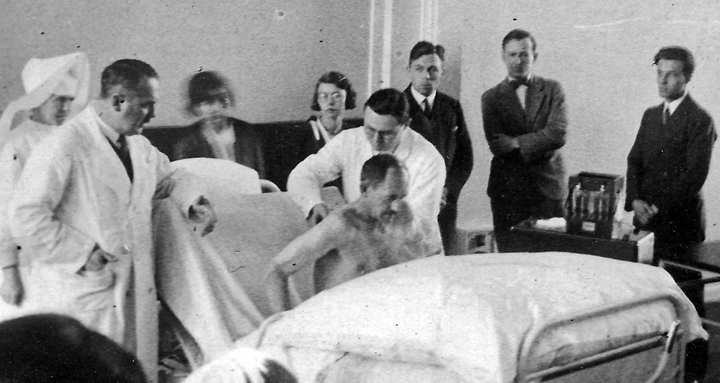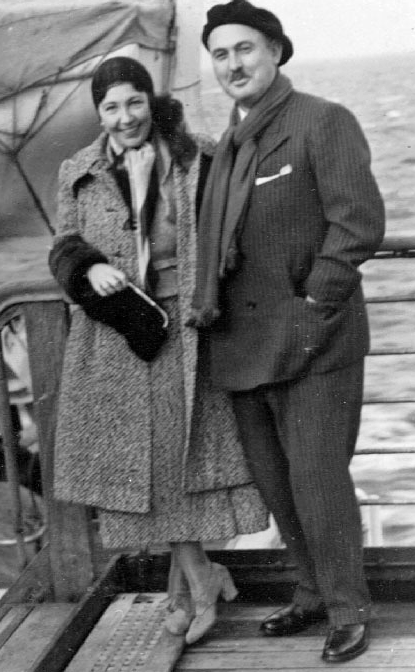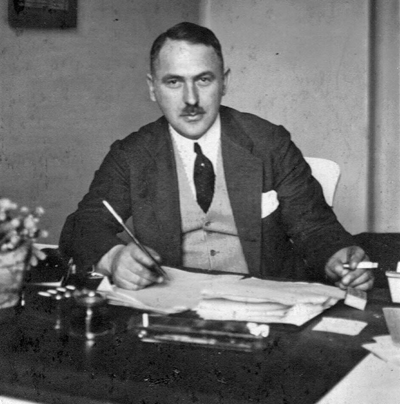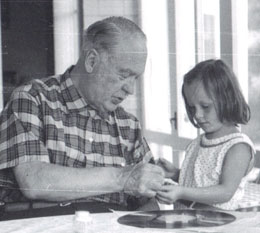Try to imagine starting over in a different county whose language you barely speak at the age of 50 when at the height of a successful career. That is what my grandfather, my “Opa,” had to do. He was a distinguished German medical doctor and scientist, a university professor and famed diagnostician. The University at Freiburg had constructed a clinic for him to entice him to head up their internal medicine department at their Medical School. But only a few years after his move to Freiburg came the dismissal of all jewish professors as part of Hitler’s new policies.
My Catholic grandmother “Oma” urged him to leave Germany and accept one of the offers he had from various universities in America and Turkey. My Opa thought the antisemitism would pass as it had in the past, after all he had an iron cross for his bravery in World War I and a flourishing private practice. She eventually convinced him it would be better for their three daughters if they left until it blew over. They never returned.
I had not realized how difficult this move must have been for him nor understood why he never went back to Germany even for a visit. However recently I read a translation of a letter he wrote in 1946 to his former colleagues when he was invited to return. This is thanks to my cousin’s son Sam Sherman, an artist living in New York City, who has been travelling in Germany doing research as part of his MFA graduate studies at CUNY Hunter College. When in Freiburg he found much of interest in the University archives, including this letter.
These words my Opa wrote really struck me: “ I cannot return, the wound is too deep, it will never heal. The disappointment of my trust in the good in German people, in the honesty of my friends was too great. The years that I can still work productively belong to the country that took me in during my deepest anguish and supported me.”
The letter includes poignant descriptions of leaving Germany and of learning new ways of teaching and approaching medical research in America.
All of the following italicized words are from his letter of 1946:
Leaving Germany
“ The train that my family and I would take to the ship gasped in the Freiburg train station. Hundreds of schoolchildren surrounded my three girls, and women, including wives of my former faculty colleagues, brought my wife to the car compartment. Few men were present. They had avoided seeing and greeting me for months. I was alone. “Must I leave, must I then leave the city,” the schoolchildren sang. I believed the world was sinking under my feet. Everything I did, what I loved, my wonderful clinic that I was allowed to build, my friends – everything was lost.”
[UPDATE from my brother] In those days it took 15 minutes for a steam engine to get ready to go (build up a head of steam) so it was customary to see important people or loved ones off at the train station. Thus the fact that the men were not there was a big snub. Also the folk song Muss i’denn is about a young man leaving his beloved one home forever due to larger events in the world beyond his control. So the choice of the women to sing this harmless folk song is perhaps a veiled criticism of the Nazi regime.
Medical Research in America
“The scientific person in the USA is evaluated only on the basis of his achievement not on his social status or familiarity with Western culture. The heritage of Western Civilization belongs to the museum. It is admired, but not counted for in the new world, which everyone has to justify and acquire with work “MADE IN USA.” Anyone who does not do this, or who is too conceited to prove himself anew, will end up in the museum, or, if he has no “historical value,” in the trash can. He will not starve to death, for in this land of abundance there is plenty of food in the trash too.”
and later on:
“It has been and still is a lot for me to learn and to revise old deadlocked views. I have to read a lot of new literature to keep pace with the vibrant, ambitious youth and to answer questions. There is no authority in this relatively new country of medical science, only positive knowledge counts. Very often, however, the written word is more valid than experience. Unfortunately, the “worship of numbers” often triumphs over natural intuition, seeing with trained eyes and the instinctive knowledge from experience. But, all in all, it is wonderful to work in this atmosphere of medical evolution.”
Teaching in America
“The way of teaching is different from teaching at German faculties. It’s more of a medical school with lessons in small classes than academic lecturing in front of a large auditorium. It would go too far to discuss the advantages and disadvantages of both education systems. In our hospital, we teach the students at Tuft’s University Medical School. They are nice, interested young people from all walks of life. Some have to earn tuition as elevator operators, clerks or workers in a technical shop to work through college. This applies to all medical schools in this country. It involves a great idealism and a gritty nature to persevere as a student with little means, and there are relatively many of them.”
In Conclusion
Click here to read more about my Opa on my family history site. That page also has links to the original letter and the full translation.
My Opa never went back to Germany. This letter gave me much more understanding of what he went through and the depth of his feelings. To me he was just my Opa whom I adored and who adored me. My main memory is that when I scratched his little bald spot on the back of his head after lunch (“growlie growlie” we called it), he gave me a quarter to go spend at the five and dime.
Thank you for coming here Opa, so that we all would be born in this land of opportunity and religious freedom.
UPDATE 20-May-2019: My brother has finished checking over the translation so click here to read our final version which includes some darker information like the gestapo attendees at his last lecture.




Thank you for sharing his letter. It’s an incredible window into that time and place!
A wonderful story and a rare gem found!
The “growlie” how you and your Opa described is probably derived from the German word “kraulen”, which sounds very similar (and describes the movement that you did).
If only we could bring back our Grandparents (and parents for some).
Thank you so much Andreas! Now I know the origin of that word
Amazing letter! Thank you sharing!
What a wonderful letter to find and have. It is a good reminder of what it was like for many who left their homeland for a new life. Many of them did not want to leave, but did what was best for their families.
My own Ukrainian grandfather came to Canada in 1913 at the age of 48 and worked on building the railroads there. He returned home and sold his house land land, again made the 2000 km journey to Rotterdam and brought my grandmother and four children back to Canada, arriving on June 5, 1914, just weeks before the events that brought on WW1. He was a man of some wealth and the mayor of his village back home, but spent the rest of his life as a common laborer, trying to provide for his family.
What a heartbreaking letter. It’s wonderful that you have this as a reminder of your Opa and also as a reminder of what happened to him and so many like him.
What a find! Fascinating look into history and into the heart of a truly good man. Thanks for sharing it.
We are grateful for those who wrote about their experiences and to those who preserved them. How can we use these lessons? This is such a touching story.
https://www.tabletmag.com/jewish-news-and-politics/284447/get-out
My uncle who was a physician too was “stuck” in Europe ( Holland I believe) during this time and could not return back to South Africa. He never wanted to return , once back in South Africa again!
My Dad was one of the first medical doctors to visit the USA ( from South Africa). Both himself and my mother strongly considered moving to the USA, but finally decided against as they considered themselves too “old” ( early 40’s) and couldn’t imagine tearing themselves from their beloved home country South Africa.
However , I believe they were my prime inspiration for packing up and coming here. ( After I met John of course!)
PS But seriously Kitty, I never knew you had Jewish ancestry !?! – maybe I forgot !! –
Lovely story!!
Kitty, that is so powerful. My grandparents left for the US in 1937 and never went back. Often, my grandmother and her German emigre friends would summer in Switzerland but they would never set foot back in Germany. The hurt was so bad that they would never heal. And I don’t blame them.
Dear cousin Neil,
Now I understand why they felt that way. Personally I also could not bring myself to go to Germany until my brother was living there. Then it was interesting to visit with the children of my mother’s non-jewish friends from Germany and hear their perspectives: how they were brought up to be European, not German.
Of course once I had gone there, I could go again and took a genealogy research trip there in 2000. That is when I took all those photographs of our ancestral town of Floss: https://kehilalinks.jewishgen.org/Floss/floss-home.html
That’s cool. I went by many years ago, but never in all my years working for Austrian and British companies. My Dad is planning his first trip to Germany this fall at 81. I forwarded your post, I hope he can make time to visit Floss.
Thank you for sharing. Most of my husband’s family stayed and died in Auschwitz. The few that escaped hid that they were Jewish. My husband and his siblings had no idea they were 1/4 Jewish until they cleaned out their parent’s house.
I just love the letter you shared. And you were an adorable little girl. Thank you.
What a beautiful tribute to your Opa, Kitty. How sad that he couldn’t go back, but his letter provides a window to why. Thank you for sharing his story. BTW, love that picture of you and him. So sweet!
Beautiful tribute to your grandfather. I’m glad they left especially with the growing rejection by his colleagues and the growth of Nazism. You were so lucky to know your grandfather. My grandfathers both died before I was born.
It turns out that my father’s family were Jewish immigrants to NYC lower east side in the late 1800’s. I didn’t know this until my mid-30’s as my parents moved to the west coast after WWII and my father was a quiet man. We only know my father’s immediate family, none of the siblings and offspring of my grandfather. No one has tried to figure out our German Jewish ancestory nor really the rest of the US Kutz family. The genealogist of the family died in his late 50’s. I don’t know if anyone survived WWII in Germany. I’m living in a completely different culture so I’m not taking it on. Learning Spanish is enough for me. And, I’m not very drawn to German culture. Prefer more Latin cultures, warmer, more fun.
I do have an 82 yo friend born in Germany in 1936. She lost her mother and twin sister to the war. Her father was an industrial engineer who was forced to maintain a busy train station or die. He sent his wife and daughters to eastern Germany for what he thought would be safer. He did find his 2 surviving daughters after the war. My friend said she didn’t know anything re the concentration camps until she went to University. She had a difficult time reconciling with her father until he came to visit her in NYC years after the war. By then she had married a wealthy Turkish Jew whose family fled Spain during the Inquisition. War, religion, politics have always caused social disruption. When she was living in the Upper East Side of Manhattan she faced discrimination just being of German heritage. Born in 1936, a displaced German refugee in her own country as a child. The war ended and at age 13, left on her own with her 10 yo sister until her father found them. I learn so much from her. She is a survivor. War, I’m not a fan.
Kathleen –
Thank you for that story, I am loving all the stories I am hearing after sharing my grandfather’s letter.
I have lots about your KUTZ family if you are descended from Alexander Jacob KUTZ – https://www.geni.com/people/Alexander-Kutz/6000000002678723837 – from the wife of Ed Kutz and his cousin Terry Kutz. You are about my 5th cousin if that is your family (Bavaria to Brooklyn).
My grandfather in this post was the great grandson of Hannah Kutz. I need to put more information on this page: http://kittymunson.com/index.php?page=kutz-family
I will email you
Kitty
I can recall Dr. Thannhauser playing golf in Wolfeboro at Kingswood Golf Club in 1956. His foursome walked the 18 holes and we caddied.
Yes that was my grandad. He had a Wolfeboro summer home, still in the family. He sometimes played with my dad Larry Munson who did not think much of my Opa’s game! So cool that you knew him that way. You probably had no idea what he had been through to get to a place in life where he could golf at that club.
Thank you all, I have very much enjoyed all the stories and thank you comments here and on FaceBook. This was a very emotional post for me to write.
I have now published an update at the end of the article with a link to the final translation of the full letter which includes some darker commentary than what I quoted above.
Kitty,
Was your grandfather S. Thannhauser of Tufts University. If so he and my uncle, Gerhardt Schmidt worked together . Gerhardt was a biochemist that workd in Thannhausser laboratory at Tufts in the late 1940s. They worked on many projects, some of it was related to insulin, and other research was related to defining and characterising Nucleic Acids. The Schmidt Thannhausser reaction is still a famous reaction that colorimetrically separates RNA from DNA based on the sugar molecules.
Yes that is my grandfather. How cool that he worked with your uncle. I will email you separately
What dignity your grandfather had. What strength if character and courage. Humility. Compassion and humanity shine ty through every word. The horror, darkness and fear he must have lived through yet he has not let it define him. Thank you for sharing
Thanks for sharing that story! May it be possible to see Opas original letter (in German)?
The original letter is posted on my Opa’s page family history site as mentioned above.
Here is the URL of the original in German letter:http://kittymunson.com/uploads/translations/Thannhauser/Original1946letter.pdf
Thank you Kitty for this wonderful insight!
Thank you so much, Kitty, for posting this heart warming and heart rending letter and peek into what your “Opa” had to do to assure the safety and survival of his family and his ability to continue his professional life in a new and very different country and environment.
Just think, we would not have you to guide us through this thorny field of genealogy. Furthermore, it shows the value, worthiness and contributions of all who wish to participate in the American Dream. Thanks again for posting and accept my warm thoughts of you and your family.
Thank you for sharing. I help at a FHC and many Jewish people wonder what it was like for their grandparents or parents in Germany. This is a wonderful letter that you have.
Pingback: Friday’s Family History Finds | Empty Branches on the Family Tree